Welcome to the wonderful world of the Miniature Piebald Dachshund! If you’re in search of a devoted and affectionate four-legged friend, this breed might be perfect for you. Miniature Piebald Dachshunds have the same charming coat patterns as their standard-sized counterparts, but they come in a smaller package.
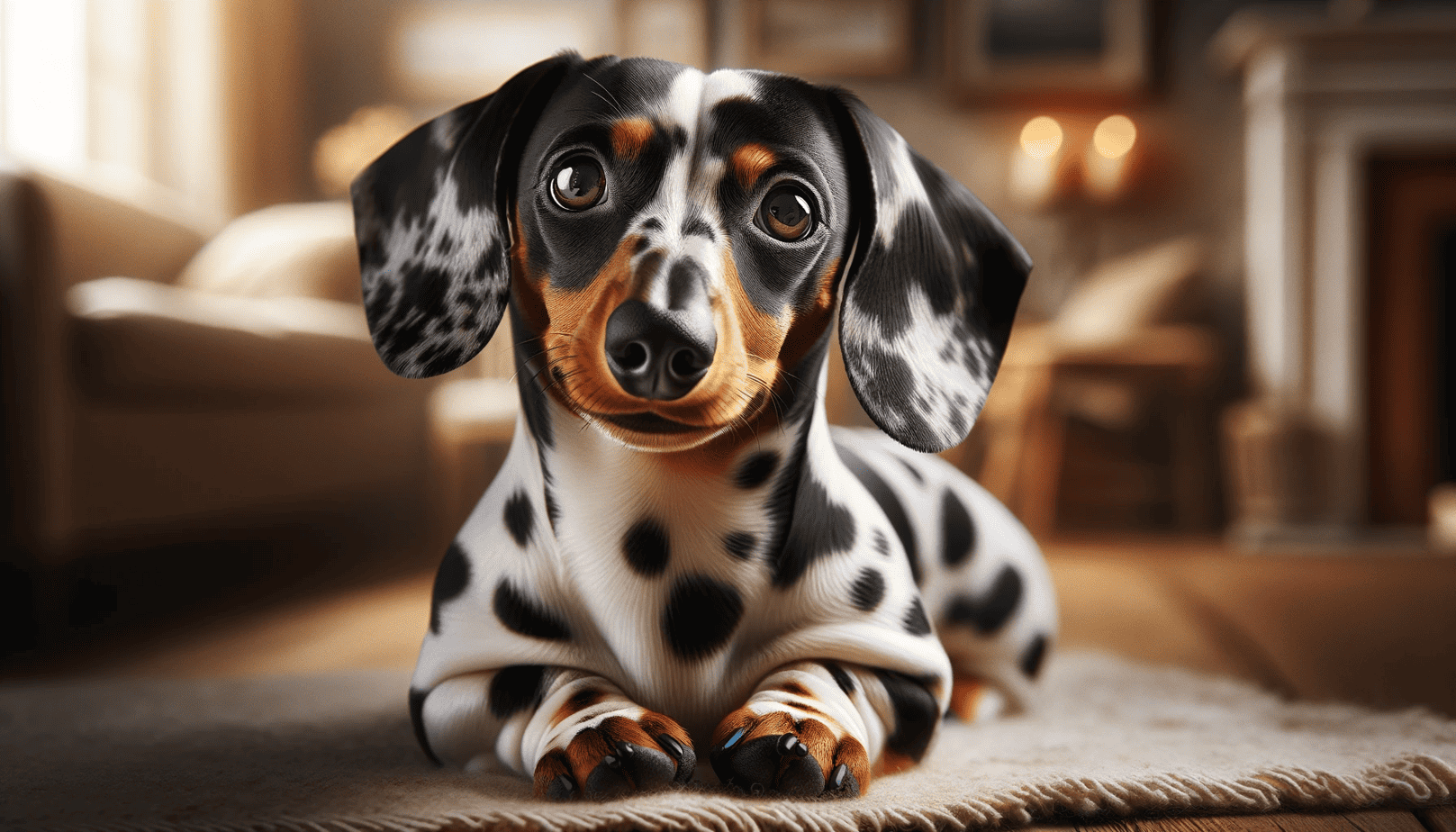
These delightful pooches are a variation of the standard Dachshund breed, renowned for their short legs and elongated sausage-shaped body. Miniature Piebald Dachshunds have a unique coat pattern characterized by white patches scattered across their body, along with darker colors like black, brown, or tan. This gives them a striking and unique appearance that catches the eye.
However, Miniature Piebald Dachshunds are not just a pretty face. They are known for their playful and affectionate temperament, which makes them excellent family pets. They are typically friendly towards children and other animals, making them an ideal addition to any household.
In this breed guide, we’ll explore everything you need to know about Miniature Piebald Dachshunds, from their origins and characteristics to their health and grooming requirements. Whether you’re a first-time pet parent or an experienced dog owner, you’ll find plenty of useful information and tips here. So let’s dive into the fascinating world of Miniature Piebald Dachshunds and discover what makes them such a beloved breed!
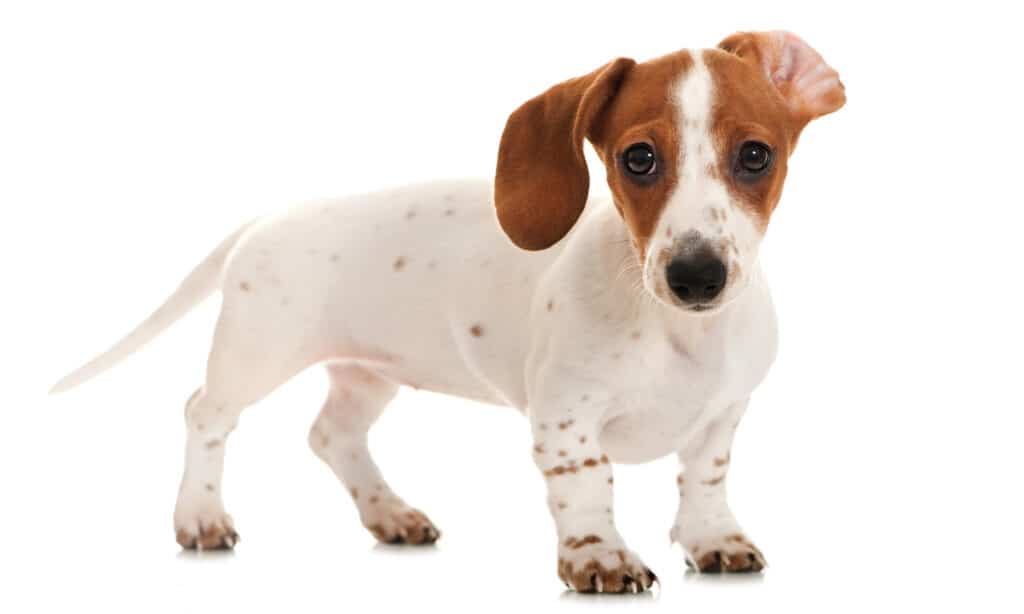
History of the Miniature Piebald Dachshund
The history of Miniature Piebald Dachshunds is closely linked to the standard Dachshund breed, which originated in Germany during the 16th century. These dogs were initially bred for hunting badgers and other burrowing animals, thanks to their long, low-slung bodies that allowed them to navigate narrow tunnels with ease.
Miniature Piebald Dachshunds are a variation of the standard Dachshund breed, and their unique coat pattern is the result of a recessive gene. This gene causes patches of white to appear on their coat, which contrasts sharply with the darker colors that typically dominate the breed’s coat. While Miniature Piebald Dachshunds have been around for centuries, they were not recognized as a distinct variety until the mid-20th century.
Despite their relatively recent recognition, Miniature Piebald Dachshunds have become increasingly popular in recent years. Their charming personalities and unique coat patterns have captured the hearts of dog lovers around the world. However, it is worth noting that a Miniature Piebald Dachshund’s coat pattern is not a guarantee of their overall health or temperament, and prospective owners should always do their research before adopting any dog breed.
Miniature Piebald Dachshund Coat and Coloration
Miniature Piebald Dachshunds are known for their striking coat pattern, which features patches of white mixed with darker colors like black, brown, or tan. The patches can vary in size and shape and are distributed irregularly over the dog’s body.
There are two main varieties of Miniature Piebald Dachshunds: single piebald and double piebald. A single piebald has a mostly white coat with patches of color, while a double piebald has a predominantly colored coat with white patches. Double piebalds are less common than single piebalds, as they require two copies of the recessive piebald gene.
Miniature Piebald Dachshunds can have a smooth, longhaired, or wirehaired coat texture, depending on their specific variety. Smooth-coated Miniature Piebald Dachshunds have a short and glossy coat, while longhaired Miniature Piebald Dachshunds have a soft and flowing coat. Wirehaired Miniature Piebald Dachshunds have a dense, harsh coat with a wiry texture.
It’s important to note that while Miniature Piebald Dachshunds have a unique coat pattern, their coloration does not affect their health or temperament. However, maintaining their coat with regular grooming is essential, as Miniature Piebald Dachshunds can be prone to skin issues due to their white coat patches. Regular brushing, bathing, and skin checks can help keep your Miniature Piebald Dachshund healthy and happy.

Miniature Piebald Dachshund Temperament
Dachshunds are known for their friendly and affectionate temperament, which makes them great family pets. They typically enjoy the company of their human family and other pets, but like any breed, individual temperaments can vary.
These dogs are intelligent and curious, which can sometimes come across as stubbornness. They are independent thinkers who may require patience and persistence during training. Positive reinforcement techniques, such as reward-based training, can help motivate and encourage your Miniature Piebald Dachshund to learn.
Despite their small size, Miniature Dachshunds have a big personality and are often described as courageous and tenacious. This stems from their history as hunting dogs who would fearlessly track and pursue prey. However, this hunting instinct can sometimes result in chasing small animals or digging, so it’s important to supervise them when outdoors.
Miniature Piebald Dachshunds thrive on attention and love to be involved in family activities. They can be playful and energetic but also enjoy relaxing with their human family members. They tend to be good with children, although supervision is always recommended, especially with younger children who may not understand how to handle a small dog.
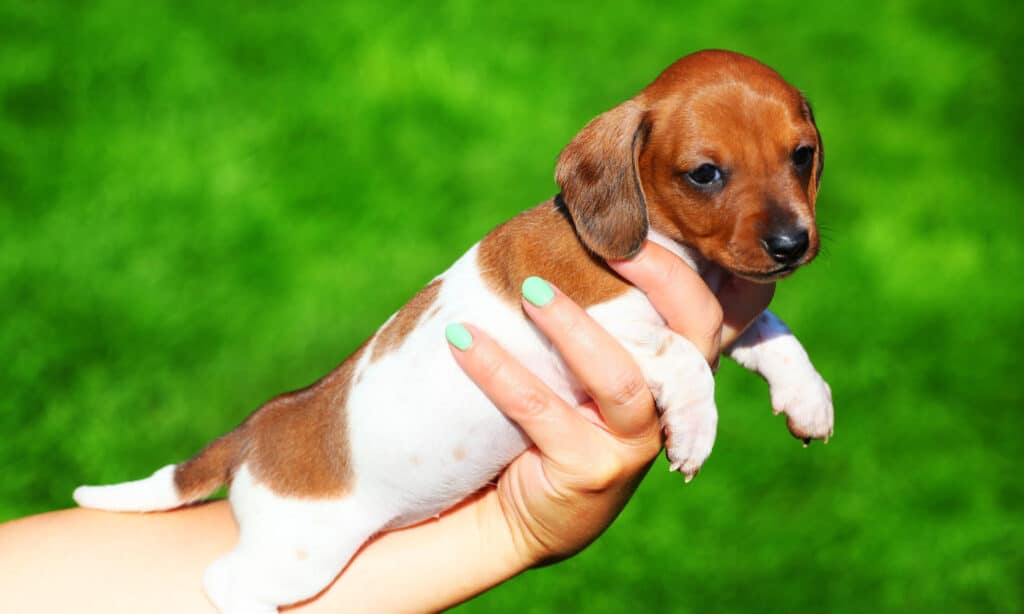
Should You Choose To Rescue or Purchase a Miniature Piebald Dachsund?
Deciding whether to buy or rescue a Miniature Piebald Dachshund is a personal choice that depends on your preferences and circumstances. Here are some factors to consider:
Buying a Miniature Piebald Dachshund from a reputable breeder can give you more control over the dog’s background, including their health, temperament, and lineage. A reputable breeder will be able to provide health clearances for the parents and offer support and guidance throughout the dog’s life. However, buying from a breeder can be more expensive than adopting from a rescue.
Rescuing a Miniature Piebald Dachshund from a shelter or rescue organization can be a rewarding experience, as you are providing a second chance at a loving home for a dog in need. Many rescue dogs have already been socialized and trained to some extent, which can make the transition to your home smoother.
However, rescue dogs may come with unknown health or behavioral issues, and their history may be limited.
If you decide to buy a Dachshund from a breeder, it’s essential to do your research and choose a reputable breeder who prioritizes the health and well-being of their dogs. Look for breeders who conduct health screenings on their breeding dogs, provide proper socialization and training for their puppies, and offer support and guidance to their clients.
If you decide to rescue a Dachshund, consider working with a reputable rescue organization that has a thorough adoption process. This should include a screening process to ensure that the dog is a good fit for your lifestyle and home environment.
Ultimately, whether you choose to buy or rescue a Miniature Piebald Dachshund, the most important thing is to provide a loving and safe home for your new furry friend.
What Should You Look For if Purchasing a Miniature Piebald Dachshund?
If you’re interested in purchasing a Miniature Piebald Dachshund, it’s important to find a reputable breeder who prioritizes the health and well-being of their dogs. Here are some key things to look for when searching for a breeder:
- Health Testing: Reputable breeders will conduct health testing on their dogs to ensure that they are free from genetic health issues that are common in Dachshunds, such as hip dysplasia, patellar luxation, and intervertebral disc disease.
- Temperament: Look for a breeder who prioritizes temperament in their breeding program. A well-bred Miniature Piebald Dachshund should have a friendly and outgoing personality.
- Breeder’s Reputation: Check the breeder’s reputation in the Miniature Piebald Dachshund community. Ask for references from other dog owners who have purchased from the breeder, and research online reviews and testimonials.
- AKC Registration: Ensure that the breeder is registered with the American Kennel Club (AKC) and that the puppies have AKC registration papers. This ensures that the puppies are purebred and meet certain standards for health and temperament.
- Puppy Health Guarantee: A reputable breeder should provide a health guarantee for their puppies. This can include a promise to replace or refund the cost of the puppy if it develops a genetic health issue within a certain timeframe.
- Puppy Socialization: Look for a breeder who prioritizes socialization in their puppies. Puppies should be exposed to different people, environments, and other dogs to help prevent anxiety and aggression issues.
By taking the time to find a reputable breeder, you can increase your chances of finding a healthy and happy Miniature Piebald Dachshund to bring into your family. Remember to do your research and ask plenty of questions before making a decision.
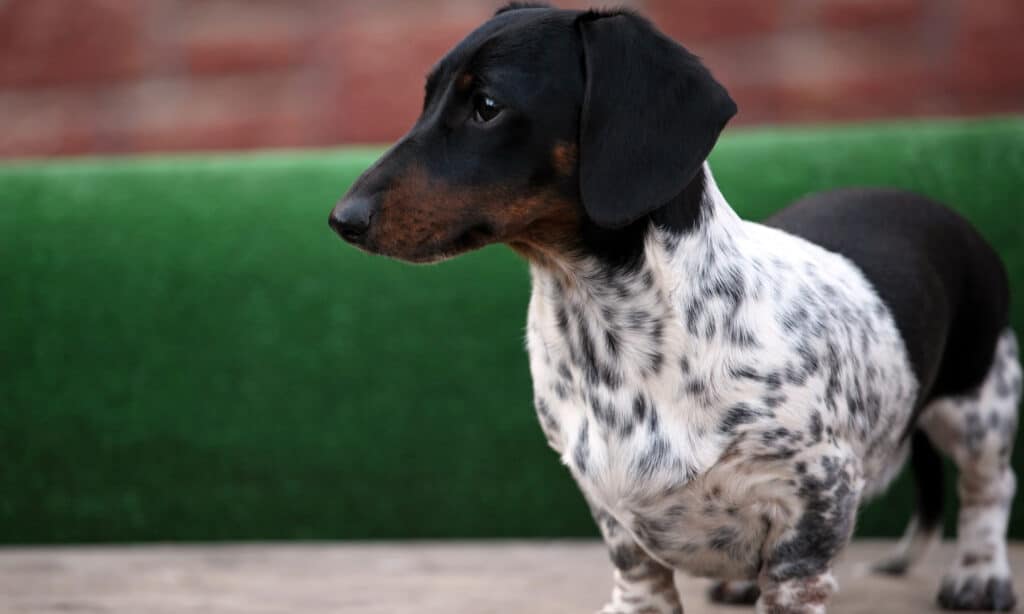
How Much Does a Miniature Piebald Dachshund Cost?
The cost of a Piebald Dachshund can vary depending on several factors such as age, breed lines, and location. Generally, purchasing a Miniature Piebald Dachshund from a reputable breeder can cost between $1,000 to $3,000. However, prices can go higher if you are looking for a show-quality or champion bloodline.
Adopting a Miniature Dachshund from a rescue organization can be a more cost-effective option, with adoption fees usually ranging from $100 to $500. However, the cost may vary depending on the rescue organization and the dog’s age and health.
It’s worth noting that the initial cost of purchasing or adopting a Miniature Piebald Dachshund is only a part of their lifetime expenses. As a responsible pet owner, you will need to budget for ongoing expenses such as food, grooming, veterinary care, and supplies. You should also be prepared for unforeseen expenses, such as emergency veterinary care.
When considering purchasing or adopting a Miniature Piebald Dachshund, it’s essential to do your research and choose a reputable breeder or rescue organization. If you opt for purchasing from a breeder, ensure that the breeder prioritizes the health and well-being of their dogs and follows ethical breeding practices. If you decide to adopt, look for a rescue organization that has a thorough adoption process to ensure that the dog is a good fit for your home and lifestyle.
While the cost of a Miniature Piebald Dachshund is a crucial factor to consider, it should not be the only one. It’s crucial to focus on finding a dog that fits your lifestyle and needs, brings you joy, and can be your loyal companion for many years to come.
Are Miniature Piebald Dachshunds Healthy?
Dachshunds, like all dog breeds, can be susceptible to certain health issues that owners should be aware of. Below are some of the potential health concerns for this breed:
- Intervertebral Disc Disease (IVDD): This is a common issue in Dachshunds, including Piebald Dachshunds. IVDD happens when the discs between the vertebrae in the spine degenerate, causing back pain, weakness, and even paralysis. Maintaining a healthy weight and avoiding activities that put undue stress on the spine, such as jumping, can help prevent IVDD. Regular veterinary checkups can also help catch the condition early.
- Eye Conditions: Piebald Dachshunds may be more prone to eye conditions such as progressive retinal atrophy (PRA) and cataracts. These conditions can cause vision loss and may require surgical intervention. Regular eye exams with a veterinarian can help detect these conditions early and prevent progression.
- Skin Issues: Piebald Dachshunds may have sensitive skin, especially in the white areas of their coat. They may be more susceptible to allergies, skin infections, and sunburn. Regular grooming, including bathing and brushing, can help keep their coat and skin healthy. Sunscreen and protective clothing can also be used to prevent sunburn in sensitive areas.
It’s essential to take steps to prevent or manage these health concerns to ensure your Miniature Piebald Dachshund stays healthy and happy. Regular veterinary checkups, a healthy diet, and exercise, as well as proper grooming, can help keep your furry friend in top shape.
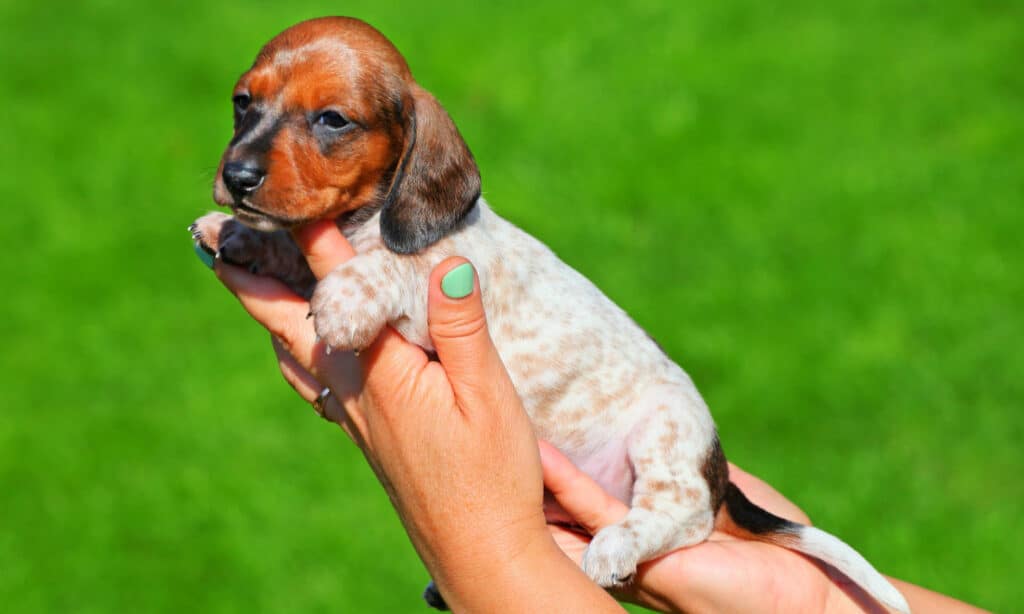
What is the Lifespan of a Miniature Piebald Dachshund?
The average lifespan of a Miniature Dachshund is around 12-16 years, although individual lifespan can be influenced by several factors, including genetics, diet, exercise, and overall health.
To ensure that your Piebald Dachshund enjoys a long and healthy life, it’s crucial to provide them with proper care and attention throughout their life. This includes regular veterinary checkups, a well-balanced and nutritious diet, adequate exercise, and socialization with both humans and other animals.
Certain health issues, such as intervertebral disc disease, which is a common ailment in Dachshunds, can impact lifespan. However, with appropriate preventive measures and management, many of these health issues can be minimized or even prevented.
Miniature Piebald Dachshunds are typically a robust breed, and their lifespan can be extended with proper care and attention. By creating a loving and healthy environment for your furry companion, you can help them live a happy and healthy life by your side.
Nutrition for Miniature Piebald Dachshunds
Proper nutrition is essential for the health and longevity of our furry friends, including miniature piebald dachshunds. Whole food nutrition has become increasingly popular among pet owners as a way to provide optimal nutrition and prevent health issues.
Whole food nutrition involves feeding our dogs natural, unprocessed foods such as lean meats, fresh fruits, vegetables, and whole grains. This type of diet provides essential nutrients in their natural form, making them easier for our dogs to digest and absorb. It can also help prevent health issues like obesity, diabetes, and heart disease.
When selecting dog food, it’s crucial to choose high-quality ingredients and avoid fillers, artificial preservatives, and by-products. It’s also important to select a food that is appropriate for your dog’s size, age, and activity level. Portion control is crucial to prevent overfeeding, which can lead to weight gain and other health issues.
Whole food nutrition can provide numerous benefits for our piebald dachshunds, including improved digestion, increased energy, and a healthy weight. However, it’s important to consult with a veterinarian before making any significant changes to your dog’s diet, especially if they have any underlying health issues.

Exercise and Physical Activity for Miniature Piebald Dachshunds
Dachshunds require regular exercise and physical activity for optimal health and well-being. These energetic dogs enjoy activities such as walking, running, playing fetch, and swimming. However, it’s important to adjust their exercise routine to their age, size, and activity level to prevent fatigue and injury.
Regular exercise helps prevent health issues such as obesity, diabetes, and heart disease in Piebald Dachshunds. It also promotes strong muscles and bones, improves joint health, and prevents behavioral issues caused by boredom and excess energy.
In addition to physical exercise, mental stimulation is also crucial for the health and happiness of our furry friends. Activities such as puzzle toys, obedience training, and interactive play keep Miniature Piebald Dachshunds mentally stimulated and prevent boredom.
It’s essential to monitor their physical and mental health regularly and make necessary adjustments to their exercise routine as they age. Older Miniature Dachshunds may require more gentle exercise, while younger ones may need more frequent activity.
Grooming Requirements for Miniature Dachshunds
Miniature piebald dachshunds have a short and smooth coat that requires minimal grooming. However, regular grooming is still important for their health and well-being. Brushing weekly with a soft brush removes loose hair, distributes natural oils, and maintains a healthy, shiny coat. It also helps to keep their coat free from mats and tangles. Bathing should only be done only as needed. Frequent bathing can strip their coat of its natural oils and cause dry skin.
Regular nail trimming is also important for piebald dachshunds. Long nails can cause discomfort and even affect their gait. Ears should be checked regularly for signs of infection or irritation. Teeth should be brushed regularly to prevent dental issues.
In addition, piebald dachshunds are more prone to skin issues in the white areas of their coat. Regular grooming can help detect and prevent skin infections and other skin issues. This includes checking their skin for bumps, rashes, and sores.

Are Piebald Miniature Longhaired Hard to Train?
Miniature Piebald Dachshunds are intelligent dogs that can be trained with patience, consistency, and positive reinforcement techniques. However, like all dogs, some individuals may be more challenging to train than others.
Dachshunds, including Piebald Dachshunds, can be independent and stubborn, making training more difficult. To motivate your furry friend, positive reinforcement techniques, such as treats, praise, and play, should be used to make training a positive experience. Consistency and repetition are also important for success.
It is recommended to start training at a young age to prevent behavior issues from developing. Obedience training can help reinforce good behaviors and provide mental stimulation for your dog. Socialization is also vital for Piebald Dachshunds to prevent anxiety and aggression towards other dogs and people.
Remember that training is a lifelong process, and ongoing training and reinforcement can prevent behavior issues from developing. Seeking the help of a professional dog trainer or behaviorist can also be beneficial if you are struggling with training your Piebald Dachshund.
Most Common Behavior Issues of Miniature Piebald Dachshunds
Miniature Piebald Dachshunds, like all dogs, can develop certain behavior issues that require attention and management. Here are some of the most common behavior issues that Miniature Piebald Dachshunds may experience:
- Separation Anxiety: Miniature Piebald Dachshunds can experience anxiety when left alone, leading to destructive behavior, excessive barking, and other issues. Gradual desensitization and counterconditioning techniques can help alleviate separation anxiety.
- Aggression: Miniature Piebald Dachshunds can be protective of their owners and may exhibit aggressive behavior towards strangers or other dogs. Early socialization and training can help prevent aggression from developing.
- Excessive Barking: Miniature Piebald Dachshunds can be vocal and may bark excessively, particularly when bored or anxious. Consistent training and providing mental stimulation can help reduce excessive barking.
- Digging: Miniature Piebald Dachshunds are bred to hunt and may enjoy digging. However, excessive digging can damage lawns and gardens. Providing an appropriate digging area and discouraging digging in unwanted areas can help prevent this behavior.
- Resource Guarding: Miniature Piebald Dachshunds may exhibit resource guarding behavior, such as growling or snapping when someone approaches their food or toys. Positive reinforcement training can help manage this behavior and teach them to share.
If you are experiencing behavior issues with your Miniature Piebald Dachshund, seeking the help of a professional dog trainer or behaviorist can be beneficial. With proper training and management, most behavior issues can be resolved or managed successfully.

Training Tips for Miniature Piebald Dachshunds
Training your miniature piebald dachshund can be a rewarding experience, but it can also be challenging. Here are some tips to help you train your furry friend successfully:
- Use Positive Reinforcement: Piebald dachshunds respond well to positive reinforcement techniques such as treats, praise, and play. These can help motivate them and make training a positive experience.
- Be Consistent: Consistency is key when it comes to training your miniature piebald dachshund. Use the same commands and reward system every time you train and be patient and persistent.
- Start Early: Starting training at a young age can help prevent behavior issues from developing and make training easier. Puppies have a short attention span, so keep training sessions short and frequent.
- Socialize: Socialization is crucial for miniature piebald dachshunds to prevent anxiety and aggression towards other dogs and people. Introduce your furry friend to different environments, people, and other dogs in a positive and controlled way.
- Provide Mental Stimulation: Miniature piebald dachshunds are intelligent dogs and require mental stimulation to prevent boredom and behavior issues. Provide puzzle toys, obedience training, and interactive play to keep your furry friend mentally stimulated.
- Seek Professional Help: If you are experiencing difficulty with training your miniature piebald dachshund, seeking the help of a professional dog trainer can be beneficial.
In conclusion, using positive reinforcement, consistency, and starting early are crucial when training your miniature piebald dachshund. Socialization, mental stimulation, and seeking professional help if needed can also help ensure that your furry friend is well-behaved and happy. With patience and persistence, you can train your miniature piebald dachshund successfully.
Conclusion
Miniature Piebald Dachshunds are a popular breed known for their lively and affectionate personalities. Their unique coat and coloration make them stand out from other Dachshund breeds. They require regular exercise, mental stimulation, and proper nutrition to maintain their health and well-being.
Training and socialization are also crucial for Piebald Dachshunds, as they can exhibit certain behavior issues if not trained properly. Positive reinforcement techniques and consistency can help ensure that your furry friend is well-behaved and happy.
Whether you are considering adding a Miniature Piebald Dachshund to your family or are already a proud owner, understanding their unique characteristics and needs can help you provide the best possible care for your furry friend. With proper care, your Miniature Piebald Dachshund can live a long and happy life as a beloved member of your family.
~Lindsie
